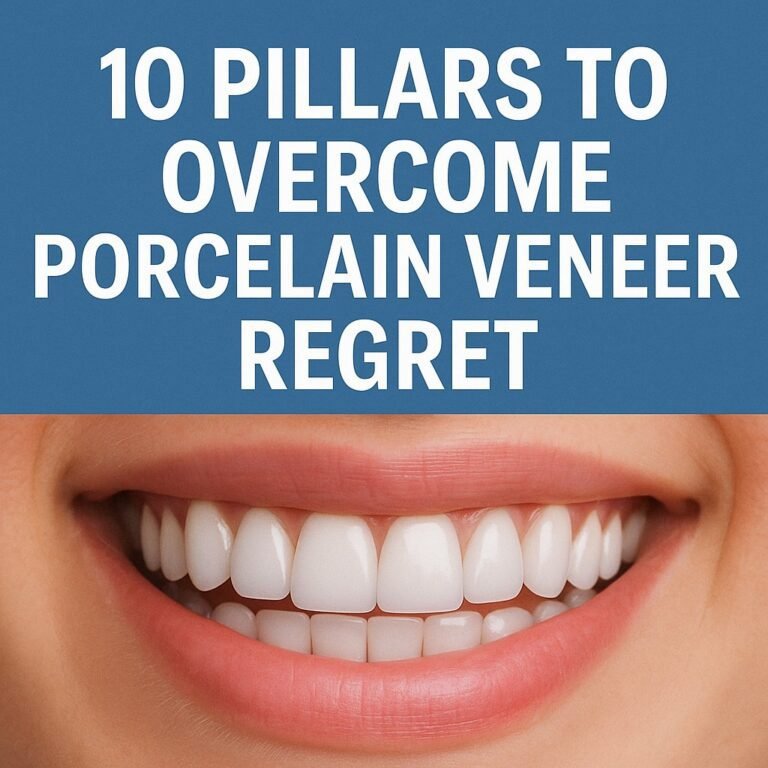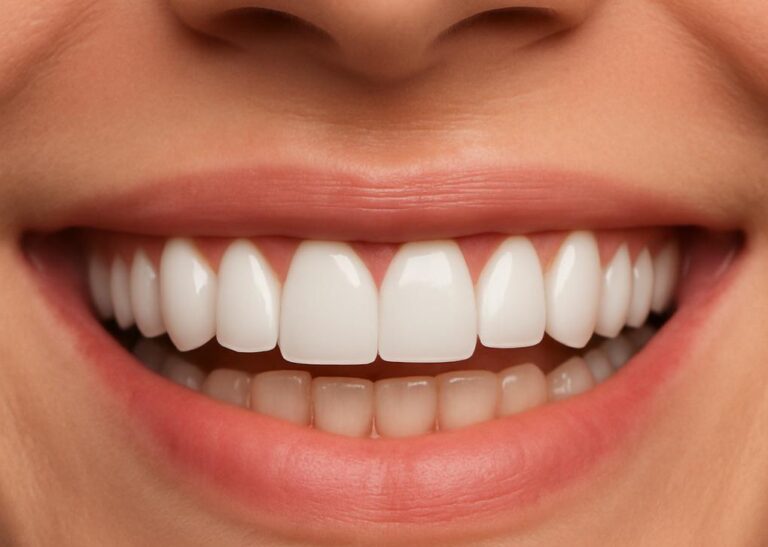Originally published on July 4th, 2024. Updated on May 27, 2025.
Since COVID-19, there has been a 20-30% increase in porcelain veneer cases due to heightened marketing and the influence of social media promoting unrealistic beauty standards.
If you feel pressured by your dentist to choose porcelain veneers or they say “This is all we can do” without exploring alternative options, it’s crucial to be aware of the following signs. Here’s how to ensure you make a well-informed decision about your dental care:

1. Lack of Comprehensive Assessment
A thorough dental examination should precede any recommendation for porcelain veneers. If your dentist doesn’t conduct a comprehensive assessment of your oral health, including X-rays and a review of your dental history, it may indicate a rushed decision.
Be cautious of dentists who exclusively recommend smile makeovers involving 10 or 12 porcelain veneers, suggesting that more veneers are necessary for optimal results
2. Minimal Discussion of Alternatives
A dentist who immediately suggests veneers without discussing less invasive alternatives, such as teeth whitening or bonding, may have a biased approach. They should present all viable options and explain why veneers are being recommended over others. When considering dental treatments like composite bonding versus porcelain veneers, it’s important not to dismiss composite bonding solely based on outdated or biased information.
Some dentists may inaccurately claim that composite bonding chips easily, is inferior to porcelain veneers, and stains quickly. However, these claims may not reflect current advancements in dental materials and techniques.

Composite bonding can provide excellent aesthetic results when applied by a skilled dentist. It’s more affordable than porcelain veneers and involves minimal alteration of natural teeth. Dentists who dismiss composite bonding outright may lack expertise in this area or have a bias towards more expensive treatments.
If your dentist suggests porcelain veneers without discussing composite bonding as a viable option, consider seeking a second opinion Another dentist may offer a different perspective and recommend the most suitable treatment based on your dental needs and preferences
3. High-Pressure Sales Tactics
Beware of dentists who use aggressive sales tactics, such as limited-time offers or discounts for immediate acceptance. A reputable dentist will provide information and allow you time to consider your options without pressure.
Steer clear of dentists who promote porcelain veneers through Instagram ads and endorsements from celebrities without providing balanced patient perspectives. This creates a one-sided narrative that may not fully inform potential patients
4. Emphasis Solely on Aesthetics
While porcelain veneers enhance appearance, a dentist should also prioritize your overall dental health. If there’s little concern for the long-term health of your teeth and gums, it might indicate a focus solely on cosmetic outcomes.
Request not only before-and-after photos but also pictures showing the teeth before preparation and images taken from different angles, avoiding close-up shots that can be misleading.
5. Lack of Transparency on Costs and Risks
Porcelain veneers come with significant costs and potential risks, including increased tooth sensitivity and the irreversible nature of the procedure. A trustworthy dentist will clearly outline all associated costs, risks, and maintenance requirements.
Ask if they offer a warranty or guarantee that covers instances where veneers chip or fail prematurely, rather than charging full price for replacements. Additionally, inquire about discounted rates for replacements if the veneers do not last the expected 10-15 years.

Make sure you have enough financial resources relative to your age to cover potential replacements every 10-15 years.
For instance, if you receive 10 teeth at $2,000 per tooth, aim to have $60,000 to $80,000 saved for ongoing maintenance. Failing to plan financially could pose unexpected challenges in the future
6. Inadequate Explanation of the Procedure
Before committing to veneers, your dentist should provide a detailed explanation of the procedure, including the steps involved, expected outcomes, and recovery process. Vague or unclear explanations should raise concerns.
If a dentist becomes frustrated with your questions or doesn’t allocate enough time for discussion, consider finding another dentist.
Similarly, be cautious if they urge you to trust them based solely on before and after pictures, as these can be manipulated with lighting adjustments
7. Unwillingness to Consider Your Concerns
Your dentist should listen to your concerns and address any questions you have about porcelain veneers. If they dismiss your worries or fail to provide satisfactory answers, it may be a sign to seek a second opinion.
What to Do If You Feel Pressured
- Seek a Second Opinion: Consult another dentist to get a different perspective on your treatment options.
- Research Alternative Treatments: Look into alternative cosmetic dental procedures to ensure veneers are the right choice for you.
- Ask Detailed Questions: Don’t hesitate to ask about the benefits, risks, and long-term implications of porcelain veneers.
- Trust Your Instincts: If you feel uncomfortable or rushed into a decision, trust your instincts and take the time you need to make an informed choice.
Conclusion
Porcelain veneers should only be recommended after careful consideration of your overall dental health and personal preferences. Be proactive in discussing your concerns with your dentist and explore all available options before committing to any cosmetic dental procedure.
Your smile and dental well-being deserve thoughtful and informed decision-making. Remember, dentistry is a business. When considering smile enhancements, prioritize 100% non-invasive options that do not involve tooth shaving

Disclaimer: This content is for informational purposes only and does not constitute medical or dental advice. Always consult with a licensed dental professional before making decisions about your oral health.





